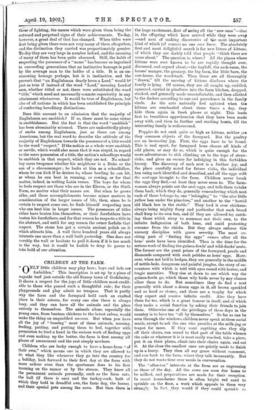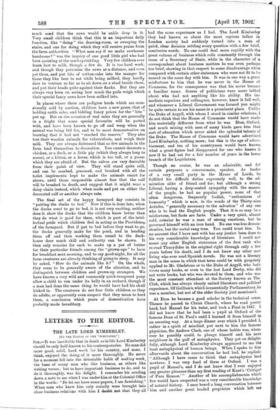CHILDREN AT THE FARM.
" ONLY little children may play here; boys and lads are forbidden." This inscription is set up by a piece of wayside turf just outside the old Surrey town of Godalming. It shows a respect for the joys of little children most credit- able to those who passed such a thoughtful rule; for their playgrounds and play admit no trespass. That is partly why the farm and the farmyard hold such an exalted place in their esteem, for every one else there is always busy, and they can have all the animals and the place entirely to themselves. The animals alone, especially the young ones, from bantam chickens to the latest calves, would make the thing an unqualified success. But when you have all the joy of " bossing " most of these animals, nursing, feeding, patting, and putting them to bed, together with permission to lend a hand in the serious work of finding eggs and even making up the butter, the farm is first among all places of amusement and the rest simply nowhere.
Children who are lucky enough to have a home-farm " of their own," which means one in which they are allowed to do what they like whenever they go into the country for a holiday, look forward to their first day at the farm with more ardour even than the sportsman does to his first morning on the manor or by the stream. They know all the permanent animals personally, such as the farm cats, the bull (if there is one) and the turkey-cock, both of which they hold in dreadful awe, the farni dog, the horses, and their special pets among the cows. But then there is
the huge excitement, first of seeing all the "new ones "—that is, the offspring which have arrived while they were away —and next of making discoveries of the most important kind of which (of course) no one ever knew. The absolutely first and most delightful search is for new litters of kittens, of which they are darkly told that people " think there are some about." The question is, where? All the places where kittens were ever known to be are rapidly thought over, discussed, and argued about,—the hayloft, the sack-room, the horses' manger, the granary, the big barn, the little barn, the cow-house, the woodstack-. Then these are all thoroughly "drawn," till the mewing of kittens discloses where the family is lying. Of course, they are all caught up, cuddled, squeezed, carried in pinafores into the farm kitchen, dropped, stroked, and generally made uncomfortable, and then allotted to the finders according to age and precedence in the family circle. As the cats naturally feel agitated when the kittens are overhauled about three times a day, they hide them again in fresh places at night. This leads first to breathless apprehension that they have been made away with, and then to further and exciting hunts, till the
interesting family is rediscovered. • Puppies do not rank quite so high as kittens, neither are they common objects of the farmyard. But the poultry are an increasing joy. First, the eggs have to be found. This is real sport, for farmyard hens choose all kinds of odd places, or may do so, which is quite enough for the more adventurous to risk climbing on to the tops of straw- ricks, and gives an excuse for indulging in this forbidden luxury. The discovery of each nest is a further joy, and the place carefully noted for future visits, the individual hen using each identified and described, and all the eggs with the nest-eggs brought to the farm. Children never break the eggs they find,—at least they never seem to. The farm- woman always points out the nest-eggs, and tells them to take them back, which they do, generally remembering which nest each of these belongs to, one " belonging" to " the nice little yellow hen under the pine-tree," and another to the " horrid old black hen in the stable." They lord it over chickens, always being mighty fussy and particular that each brood shall keep to its own hen, and (if they are allowed to) catch- ing those which stray to mammas not their own, to the infinite indignation of both hens, and amid protesting screams from the chicks. But they always enforce this nursery discipline with grave severity. The most ex- citing part of "finding the eggs" comes after all the hens' nests have been identified. Then is the time for the serious work of finding the guinea-fowls' and wild-ducks' nests. The former are the great prizes of the farmyard, pearls and diamonds compared with such pebbles as hens eggs. More- over, when not laid in hedges, they are generally in the middle of nettle-beds, dangerous and painful jungles, the story of en- counters with which is told with eyes round with horror, and tragic narrative. They rise at dawn to see which way the guinea-fowls go, which those wily birds never by any chance allow them to do. But sometimes they do find a nest generally with about a dozen eggs in it, all brown speckled and as hard as stones, and these are a trophy for which they expect and receive infinite credit. Also they have them for tea, which is a great honour in itself, and of which they make a social function by asking their friends to join them. Otherwise one of the privileges of these days in the country is to have tea "all by themselves." So far m can be seen through the windows, children never speak at these social meals; except to ask the one who presides at the milk-jug or teapot for more. If they want anything else they slip off their chairs, run round to that part of the table whence the cake or whatever it is is most easily reached, take a piece, put it on their plates, climb into their chairs again, and eat it. At the close the smallest ones are quietly made to finish up in a hurry. They then all say grace without comment, and rim back to the farm, where they talk incessantly. But they do not waste time over meals in conversation.
The " after-tea " interests at the farm are as engrossing as those of the day. All the cows are soon due home to be milked, and preparations are made for their reception. In smart home-farms there is often bright red sand to sprinkle on the floor, a work which appeals to them very strongly. In fact, they would if they could sprinkle so
much sand that the cows would be ankle deep in it. Very small children think that this is an important daily function, like " doing " the drawing-room, or sweeping the stairs, and one for doing which they will receive praise from the farm authorities. " What men say if we make cowhouse handsome ? " was the inquiry of one good little girl who had been assisting at the sand-sprinkling. Very few children ever learn how to milk, though a few do. It is too hard work, and though they patronise the cows at a distance, and even pet them, and put bits of cotton-cake into the manger for those they like best to eat while being milked, they hardly dare to venture so far as to sit down on a stool beside them, and put their heads quite against their flanks. But they are always very keen on seeing how much the pails weigh which their special fancy cows have been milked into.
In places where there are pedigree herds which are occa- sionally sold by auction, children have a new game, that of holding cattle sales, and bidding fancy prices for the " lots " put up. But on the occasion of real sales they are generally in a fright that some special favourite will be parted with, and have been known to go off and weep when the animal was being bid for, and to be most demonstrative on learning that it had not "reached the reserve." They also test their wooden animals for tuberculosis, and weigh their milk. They are always distressed that so few animals in the farm lend themselves to decoration. You cannot decorate a chicken, or a duck, or a little pig (which they always long to nurse), or a kitten, or a horse, which is too tall, or a goose, which they are afraid of. But the calves are very desirable from their point of view. They will stand quite still, and can be combed, groomed, and brushed with all the toilet implements kept to make the animals smart for shows, until those responsible almost fear that the calf will be brushed to death, and suggest that it might wear a daisy chain instead, which when made and put on either the decorated calf or another always eats.
The final act of the happy farmyard day consists in "putting the ducks to bed." Now if this is done late, when the ducks want to go to bed, it is not very exciting, neither does it show the ducks that the children know better than they do what is good for them, which is part of the intel- lectual pride which children feel in acting as the Providence of the farmyard. But if put to bed before they want to go, the ducks generally make for the pond, and in heading them off and then working them round to the duck- house door much skill and authority can be shorin. It then only remains for each to make up a pat of butter for their particular friends among the " grown-ups " to have for breakfast next morning, and to say good-night, for all the farm creatures are already thinking of going to sleep. It may be asked, "How do the animals like it? " On the whole, they seem to be generally aware of the situation, and to distinguish between children and grown-up strangers. We have known a very wild and commonly quick-tempered pony allow a child to run under its belly in an orchard, though if a man had done the same thing he would have had his skull kicked in. The creatures do not fear little children as they do adults, or apparently even suspect that they mean to hurt them, a conclusion which years of domestication have probably made hereditary.











































 Previous page
Previous page